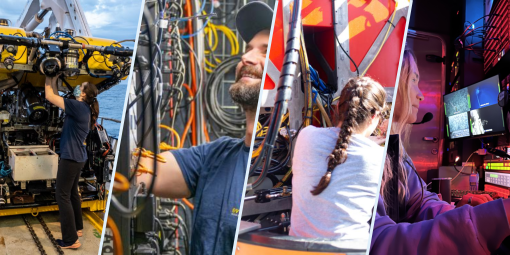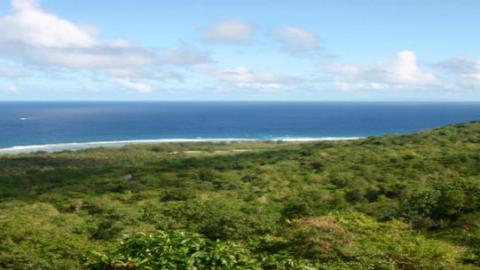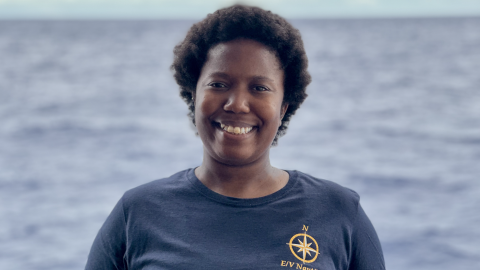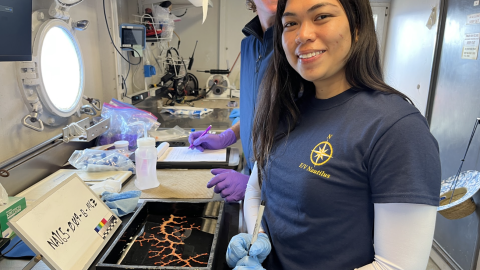Engineering and Ocean Exploration: OET Engineering Careers

From February 16 - 22, 2025, the world is celebrating Engineers Week. Here at Ocean Exploration Trust, engineering is essential to our goals of pushing the boundaries of scientific exploration and technological innovation of our world’s oceans.
Did you know there are different kinds of engineers that sail aboard E/V Nautilus?
The international Nautilus Corps of Exploration consists of engineers, scientists, technologists, educators, students, and mariners in various specialties. Whether you’re interested in mechanical, environmental, electrical, data, video, or any other type of engineering, there is a role for you in ocean exploration!
Some of the engineering-related jobs onboard our ocean exploration vessel are:
ROV Engineer and Pilot
ROV pilots are engineers and technologists who maintain and control large remotely operated vehicles (ROVs) that the Corps of Exploration uses to explore the seafloor and water column. Being an ROV pilot also involves contributing to the maintenance, troubleshooting, and repairs of the ROVs, ensuring the vehicle and its cameras, sampling tools, and sensors are ready for the science team to complete their goals. One pathway to working with robotics is being a mechanical systems engineer, which involves building new tools and working with the physical parts of these systems. Electrical specialists are also important engineers on the team as they work with the networking, communications, and high-voltage systems that make up an ROV.
Within the Corps of Exploration, ROV pilots have degrees and certifications in many fields, including ocean engineering, mechanical engineering, electrical engineering, biology, and computer sciences. Other careers with similar skill sets include: systems engineer, electrical engineer, mechanical engineer, petroleum engineer, electrician, machinist, ocean engineer, computer-aided design (CAD) drafter, architect, and more.
Data Engineer
A data engineer is a Corps of Exploration member who ensures all data is recorded, archived, and documented to meet the highest scientific standards during exploration missions. Data is gathered through many pathways aboard the ship, including; seafloor mapping soundings, weather information from the bridge, underwater still images, topside photography, high-definition video feeds from the many cameras on ROVs, and more. The data engineers also maintain all onboard computer network systems, the satellite system, and are responsible for the data acquisition computers and all the needed software for exploration. They use a variety of computers to maintain the ship information network including routers, firewalls, and physical cabling, along with the satellite dish systems that uplink data to shore.
Within the Corps of Exploration, data engineers have training, degrees, and certifications in computer science, geographic information systems (GIS), programming, marine operations, communication technology, satellite engineering, and data science. Data engineers have skills coding in scripting languages (e.g. Perl, Bash) and general-purpose languages (e.g. Python, C/C++, Java) and experience working with different systems like Windows, Mac, and Linux. Similar careers include computer programmer, data scientist, systems engineer, computer engineer, IT manager, automation control engineer, software developer, information security analyst, marine technician, database engineer, web developer, and more.
Video Engineer
Video engineers manage the video feeds from ROVs underwater and cameras around the ship. While exploring, pristine video is the critical data deliverable to science teams, allowing them to analyze the seafloor and review discoveries after the expedition. Video engineers ensure video recordings meet rigorous broadcast and scientific standards; they image items of interest by controlling the ROV camera’s zoom, focus, color, and iris. They monitor the 36 cameras used in E/V Nautilus’ exploration model and configure the intercom system to ensure different stations around the ship can communicate with each other and inside the control room.
Within the Corps of Exploration, video engineers have training, degrees, and certifications in many fields, including wildlife camera operation, computer science, broadcast technology, satellite engineering, video production, and graphic design. Many video engineers begin their work on Nautilus as a Video Engineering Intern in the Science & Engineering Internship Program as a community college, undergraduate, graduate student, or early career professional studying video production.
Technology Specialist
Technology specialists use their imaginations and educational backgrounds to design, engineer, and develop exploration technology. They design specific tools to help address a challenge scientists have in understanding our global ocean. These tools can be added onto ROVs or function on their own to collect data from the deep sea, the ocean surface, or anywhere in between.
Technology specialists have varied backgrounds, including engineering, computer science, robotics, and manufacturing. Unique skills like 3D printing, electrical engineering, coding, and even architectural design are essential for creating successful marine technology. Many of them, as kids, liked to invent new machines or build with Legos!



